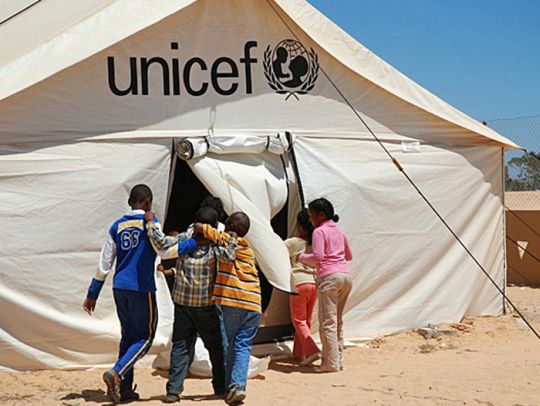More than a million children set to return to school in Libya – UNICEF
More than a million children set to return to school in Libya – UNICEF
 Children enter a UNICEF-supported tent school at the Shousha transit camp on the Libyan border
Children enter a UNICEF-supported tent school at the Shousha transit camp on the Libyan border
At least 1.2 million Libyan pupils are set to return to school tomorrow, almost a year after they evacuated their classrooms during the country’s popular uprising against the regime of Muammar al-Qadhafi, the United Nations Children’s Fund (UNICEF) reported today.
The agency said about 27 million textbooks are being printed by Libya’s education ministry and 10 million have already been distributed in anticipation of the return to school.
But a shortage of both books and desks remain, and transport to and from school is also lacking for many children.
“This is a massive operation and a huge achievement for the people of Libya,” said Maria Calivis, UNICEF’s regional director for the Middle East and North Africa in a statement released today.
At a time of great hope and upheaval, no sector has more potential than education to improve society and restore normalcy for children.
“At a time of great hope and upheaval, no sector has more potential than education to improve society and restore normalcy for children.”
Libyan authorities, supported by UNICEF and others, have worked to clear rubble, landmines and unexploded ordnance (UXO) from schools and to rehabilitate many of the buildings and other infrastructure.
Children who have been distressed by the conflict have been given psycho-social support and mechanisms are in place to ensure that vulnerable children are enrolled in classes.
A survey will also take place later this month to amass data on equipment, supplies, teaching materials, teachers and enrolment.
UNICEF reported that Libya has relatively good education indicators, but the country’s school system needs to be more responsive to minorities, children with disabilities and gender disparities.
Ms. Calivis stressed that investing in a more inclusive education system “is a first step towards building a tolerant and productive society.”
###
About United Nations Children’s Fund (UNICEF)

UNICEF works in 190 countries and territories to help children survive and thrive, from early childhood through adolescence. The world’s largest provider of vaccines for developing countries, UNICEF supports child health and nutrition, good water and sanitation, quality basic education for all boys and girls, and the protection of children from violence, exploitation, and AIDS. UNICEF is funded entirely by the voluntary contributions of individuals, businesses, foundations and governments. For more information about UNICEF and its work visit: www.unicef.org
###
> United Nations (UN).
 The United Nations was established on 24 October 1945 by 51 countries committed to preserving peace through international cooperation and collective security. Today, nearly every nation in the world belongs to the UN: membership totals 192 countries.
The United Nations was established on 24 October 1945 by 51 countries committed to preserving peace through international cooperation and collective security. Today, nearly every nation in the world belongs to the UN: membership totals 192 countries.
When States become Members of the United Nations, they agree to accept the obligations of the UN Charter, an international treaty that sets out basic principles of international relations. According to the Charter, the UN has four purposes:
- to maintain international peace and security;
- to develop friendly relations among nations;
- to cooperate in solving international problems and in promoting respect for human rights;
- and to be a centre for harmonizing the actions of nations.
###
* The above story is adapted from materials provided by United Nations (UN)
** More information at United Nations (UN)




















